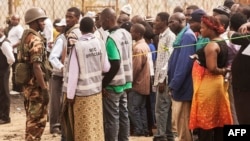Pressure is mounting on the government of Malawi to fast-track the process of issuing national identity cards (IDs) to address the challenges Malawians have long faced due to the absence of the documents. Malawi is the only country in southern Africa without such IDs for its citizens.
Malawians currently use driving licenses, passports, and in some cases voter registration certificates as proof of their citizenship in places and institutions where identification is needed.
Those who don’t have such documents are asked to bring any person with a passport or driving license to be a witness.
Malawians who cannot fulfill such requiremenrts cannot get assistance in places like commercial banks and money lending institutions.
Business impact
Janet Manda, a small-scale business woman in Malawi’s commercial capital, Blantyre, told VOA that it took her more than three months to convince a person to be her witness to get a loan to start her business in 2005.
“Many people with passports were refusing to confirm my citizenship before the money lending institutions in fear of being penalized in case I run away with the money for fail to repay the loan. I was served by one lady who offered to help on condition that I should be her business partner,” said Manda.
Health authorities say the absence of national IDs is putting strain on medical resources because foreigners come to take advantage of free medical services in public hospitals, particularly in border districts.
“Last year, we did a survey at the [Dedza district] hospital," said Harold Kabuluzi, spokesperson for Dedza District Health Office which borders Mozambique in central Malawi. "We found that almost half of our in-patients were Mozambicans. So when we asked them, they told us that they are coming from Malawian villages bordering Mozambique… So, if the IDs are introduced in Malawi we will be able to trace which one are Malawians are which ones are Mozambicans.”
Kabuluzi says the hospital’s budget for medical supplies has always failed to meet the demand.
Campaigners against child trafficking say lack of identification is contributing to an increase in trafficking cases.
"In fact most of the time when someone is taking kids from one place to another, actually you would have difficulties to know who these kids are and what is the relationship between that ‘trafficker’ and the kids themselves because most of the times when you ask them, they will tell you ‘these are my kids, these are my relatives and I am taking them somewhere’," Hastings Jumbe, president of Journalists Against Child Trafficking, said. " So most of the time you wouldn’t force someone to identify themselves yet the ID is not there,”
National Registration Bureau
Malawi's government introduced the National Registration Bureau in 2007 to oversee the process of issuing national identity documents. But seven years since its inception, the bureau has yet to issue IDs.
Spokesperson Norman Fulatira told VOA the bureau has financial constraints.
“It is the procurement of the equipment that will enable the NRB to produce identification documents in the form of birth certificates, National IDs and Marriage certificates and that has not been done. So we as NRB could not tell when we will start issuing the certificate," said Fulatira.
In the current national budget, the bureau has been allocated less than a quarter of the money it needs - which Fulatira says is likely to further stall the issuance of IDs.




